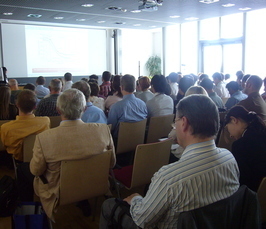MPI Kolloquiumsreihe: Dr. Adam Weber, Exploring Polymer-Electrolyte Fuel Cells using Physics-Based Modeling
MPI Kolloquiumsreihe: Dr. Adam Weber, Exploring Polymer-Electrolyte Fuel Cells using Physics-Based Modeling
- Datum: 12.12.2018
- Uhrzeit: 16:00 - 17:00
- Vortragende(r): Dr. Adam Weber
- Energy Conversion Group, Lawrence Berkeley National Laboratory, Berkeley CA 94720, USA
- Ort: Max-Planck-Institut Magdeburg
- Raum: Großer Seminarraum "Prigogine"
- Kontakt: sek-pcp@mpi-magdeburg.mpg.de

Das Max-Planck-Institut Magdeburg lädt Sie herzlich zu seiner öffentlichen Kolloquiumsreihe ein.
Hochrangige
Wissenschaftler verschiedener Fachgebiete aus renommierten
Forschungseinrichtungen aus Deutschland und weltweit präsentieren ihre
Forschungsarbeit.
Exploring Polymer-Electrolyte Fuel Cells using Physics-Based Modeling
Cost and durability of polymer electrolyte fuel cells (PEFCs) remain the major hurdles in way of their commercialization. To optimize cell performance and understand degradation mechanisms, mathematical modeling provides an ideal framework. The need to drive towards high power density and thus reduce stack count and cost required optimizing the mass transport and related phenomena within the PEFC. For proton PEFCs, such mass transport is dominated by transport of oxygen molecules to the reaction site within the catalyst layer. For hydroxide PEFCs, additional transport limitations including hydroxide ions and perhaps even hydrogen can become important. In addition, transport phenomena in both cells are hindered by multiphase flow phenomena due to the lower operating temperatures and need for membrane humidification. In this talk, we will explore the limiting transport mechanisms and effects through mathematical modeling. Thus, we will explore the gas transport limitations within PEFC catalyst layers, with a focus on the observed local transport resistance as measured using hydrogen and oxygen limiting current measurements. We will correlate these measured resistances using a mathematical model. Using the model, we will also examine test cases for diagnosis of polarization curves in terms of different limiting phenomena. Different oxygen concentrations, catalyst-layer properties, and operating humidity and temperature will be examined.
Water management is a more serious concern in hydroxide PEFCs, because OH- conductivity is more highly dependent on water content and the ORR consumes water. Compared to proton PEFCs, the lower performance of hydroxide PEFCs is mostly caused by extremely nonuniform distribution of water in the ionomer phase between the anode and cathode as well as the increased overpotential for the hydrogen oxidation reaction. In this presentation, we will discuss the performance-limiting mechanisms specific to different operating conditions (e.g. varying inlet relative humidity (RH)) based on a cell-level mathematical model. We will also explore the interactions endemic in this systems when operated on air that contains 400 ppm CO2 through 1+2D modeling framework.
Finally, coupling methodologies will be discussed. These include examining detailed pore-network models of GDLs with cell electrochemical models as well as the coupling between performance and mechanical models to explore the synergistic effects of crossover and humidity-induced stress on membrane pinholes and cell performance.
Acknowledgements
This work was mainly funded under the Fuel Cell Performance and Durability Consortium (FC PAD) funded by the Energy Efficiency and Renewable Energy, Fuel Cell Technologies Office, of the U. S. Department of Energy, Program Development Manager Greg Kleen.